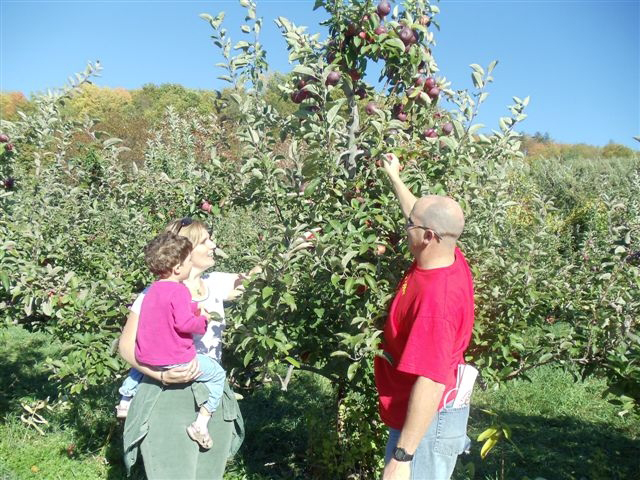The success of this year’s apple season is largely dependent on whom you talk to.
Some of the region’s apple producers have enjoyed a steady season while others have not.
“In terms of production levels, it’s on the lower side of normal,” said Kevin Iungerman, Northeastern New York Fruit Program commercial fruit educator with Cornell Cooperative Extension.
According to Iungerman, there was a substantial frost occurrence on May 10 that impacted this year’s crop. “It was a marginal situation because we were past bloom stage and in fruiting stage,” he explained. “It was largely dependent on the location and terrain of your orchard.”
Terry Bradshaw, president of the Vermont Tree Fruit Growers Association, echoed those sentiments.
“The main negative weather factor facing growers was isolated frost, particularly on May 10-11, when most orchards were either in full bloom or just past it with tender, developing blossoms or fruitlets exposed on the trees. Actual crop damage was variable across the state and generally concentrated on sites with poor air drainage or away from the influence of temperature-moderating bodies of water.”
For local producers whose orchards were perched on hillsides or at higher elevations, this season’s crop has yielded a large quantity of fruit.
“Once we got past the frosty weather early, everything responded to the weather favorably,” said Mel McWhorter, who along with his wife, Kerrie, owns McWhorter’s Orchard in Argyle. “Being on a hill with good air drainage was key. The crop is good and there was very little frost damage.”
Others however were not so fortunate.
Sbardella’s Orchard on the Vermont-New York border in Hampton was unable to open this season.
In a statement on their website, they reported: “I’m sorry to say that we were pretty wiped out by a frost. The orchard was in full bloom when it hit and we lost almost all the apples. We will not be open for pick your own or picked by us this season.”
Most local orchards fell somewhere in between.
“Because of the weather in the spring we lost some apples,” Hicks Orchard store manager Cara Duffy said. “We lost three varieties, but otherwise it’s been about average.”
Although growers couldn’t prevent frosty weather, they were not completely defenseless. Most growers have several methods they can employ to at least lessen the blow caused by a frost.
“We were out there starting bonfires trying to circulate the air,” Duffy said.
Rob Steingress with Mendon Mountain Orchards in Vermont explained that they made the decision to forgo chemical thinning this year. “We decided not to chemically thin, which I think helped saved us.
According to Steingress, they normally make use of chemicals to thin the number of fruit blossoms in the spring; however, fearing a reduction of viable blossoms due to the weather, they did not carry out that practice this year.
Between the extra blossoms and a good pollination in the spring their orchard produced an above average crop.
Fortunately, for those who survived the frost, this year’s weather proved especially favorable for the growth of apples.
“2010 has been an interesting, and to some degree, outstanding year for apple crops. Aside from some frost occurrences, the season was generally warm with adequate moisture for good tree and crop development,” Bradshaw said.
“The quality of the crop has been very good and the size (of the crop) has been adequate,” McWhorter said.
Because of the sunshine and heat this summer, there was increase in the sugar levels of the fruit, making for some excellent apples.
“The flavor is very good this year,” Iungerman said.
Duffy supported that assertion. “The Macs were much sweeter.”
That sunshine and heat, along with an early spring created an earlier season.
“We were two weeks early this year,” McWhorter said.
“Earlier varieties ripened about seven to ten days ahead of schedule. By midseason, however, most varieties caught up to their normal ripening periods with the onset of moderating temperatures,” Bradshaw explained.
Whether or not orchards were affected by the frost, business has remained steady, growers explained.
Duffy reported that Hicks has enjoyed its typical business volume and got busy about a week before they had anticipated.
“Our customer base has been very enthusiastic,” McWhorter said.
According to Iungerman, the nice weather on weekends has been beneficial to local orchards.
“Business has been very good,” he said.
However, because of a slightly reduced crop on a regional level and the closure of some orchards, the apple season appears to be coming to an end.
“Normally we pick our crop five or seven weekends, but this year it’s probably going to be four or five because of demand,” McWhorter said.
Most local orchards plan to be open through at least this weekend, but if you plan on going out, it may not hurt to call ahead.
“We think we’ll probably still have a decent weekend of the (Oct.) 17th,” Duffy said.




